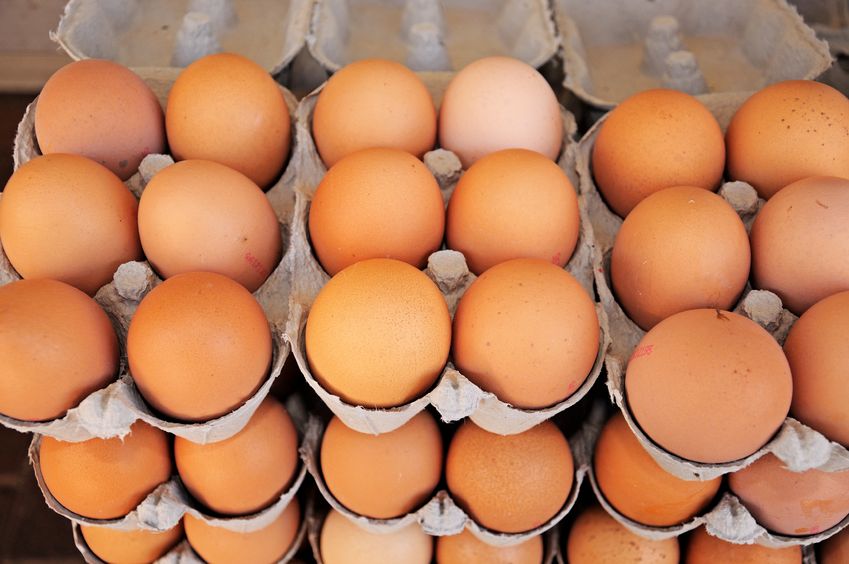
The fipronil scandal and fears about the effects of Brexit on cross-Channel trade are boosting demand for home-produced eggs for processing.
The culling of millions of layers in Europe has led to egg shortages on the continent and helped to push up prices both there and in the UK.
And with UK layer flocks shown to be clear of any fipronil contamination, more buyers are seeking out home-produced egg, pushing up wholesale prices still further.
"The demand for UK, home produced is up. Lion has done a good job focusing on the fipronil issue," according to Bumble Hole Foods managing director Barry Jackson.
The scandal involved the use of fipronil - a chemical banned from use on animals in the food chain - in a treatment for red mite in the Netherlands.
The UK Food Standards Agency (FSA) said that some 700,000 potentially contaminated eggs had been imported into this country from Europe and a number of prepared food lines were removed from supermarket shelves.
However, tests on British farms found no trace of the banned substance.
Increase in demand
Mr Jackson, whose company already sources mainly British eggs, said there had clearly been an increase in demand for domestic eggs for processing since the scandal arose.
"Definitely. There is a real focus on British - where they are going to get egg from." But he said that the UK egg industry had to be careful about pushing too much too quickly.
"There is a danger," he said. "Lion has to be careful because it could end up creating a demand for something that just isn't there."
He said the UK currently did not have enough egg available to meet the whole needs of the UK processing sector.
"Processing accounts for a quarter of the UK egg sector," said Mr Jackson. "But seconds in UK flocks are only about five per cent. British producers are very good at producing good eggs.
"There are a lot of new sheds with new equipment and improved genetics and the level of seconds is very low."
'Double standards'
Mr Jackson said that, with such low levels of seconds, supplies for the processors were limited. He said what was needed was more producers producing eggs directly for the processing sector.
"We are looking at more direct contracts with producers to supply egg for processing."
He said that, if Lion wanted to press for the use of more British eggs in processing, it needed to accept that this would not be a short term fix because of the shortage of eggs for product.
Sourcing British eggs for processing should be a longer term strategy, he said.
When news of the fipronil contamination on the continent emerged, Ian Jones, chairman of British Lion Egg Processors, criticised retailers for using imported egg in products.
“The major retailers are operating to double standards when it comes to eggs. All of them stock British Lion shell eggs but they use imported eggs in many of their other foods containing eggs."
He said: “As we approach Brexit, shoppers are growing increasingly concerned about the ingredients used in manufactured food and now more than ever want and deserve transparency on food packaging.
“The egg industry believes that this is a great opportunity for retailers to listen to the concerns of their customers and reassure them by specifying the use of British eggs and using the ‘Made with British Lion eggs’ logo on packs.”
Reduced supplies
More British eggs were now being specified for processing, said Barry Jackson, but Lion could only push so far at the moment.
"If customers ask for British eggs and they are not available they will just get ticked off."
Mr Jackson said we were now at the time of year when demand for processed egg would normally be increased in any event - particularly in the period up to Christmas.
"Demand is good but supply is tight. We are only 85 per cent self sufficient in eggs, anyway. The rest is brought in."
However, the destruction of eggs on the continent contaminated with fipronil and the culling of large numbers of layers has reduced supplies across the Channel, pushing up wholesale prices both there and here.
Fall in Sterling
It is not only the fipronil crisis that is causing customers to look closer to home for egg product.
The fall in the value of Sterling since the referendum on membership of the European Union has made imports more expensive.
Dale Burnett, chief executive of the country's biggest egg company, Noble Foods, told delegates at the annual conference of the British Free Range Egg Producers Association (BFREPA) in October: "The exchange rates have gone in favour of exporting rather than importing.
"We are finding that, although the retail sector is predominantly British, I refer to the products division we have, there was a lot of liquid egg coming into the UK and that's starting to dry up now.
"It is more expensive to bring product into the UK and better to export from the UK. Exchange rates are maybe strengthening our position.
"Trade deals will probably strengthen it further. Are we going to have free trade or are we not? If it's not and there are going to be tariffs then it will be even more expensive to bring products in."
Barry Jackson told FarmingUK that concerns about the possible implications of Brexit were having an effect on people looking to source more British product.
If there was no trade deal with the EU and there were challenges importing egg from the continent, customers would need to think more about buying eggs at home.
